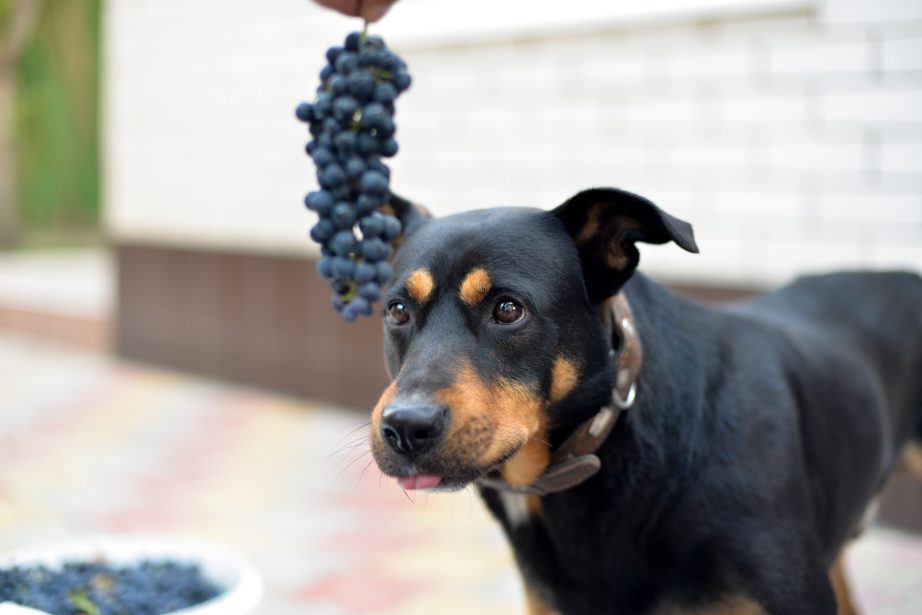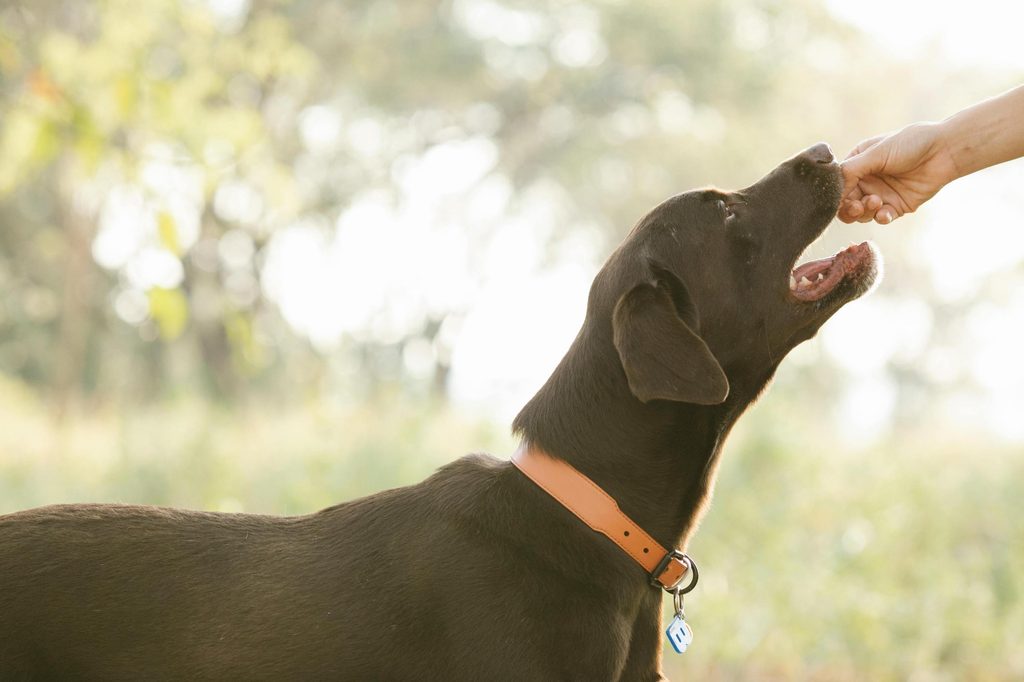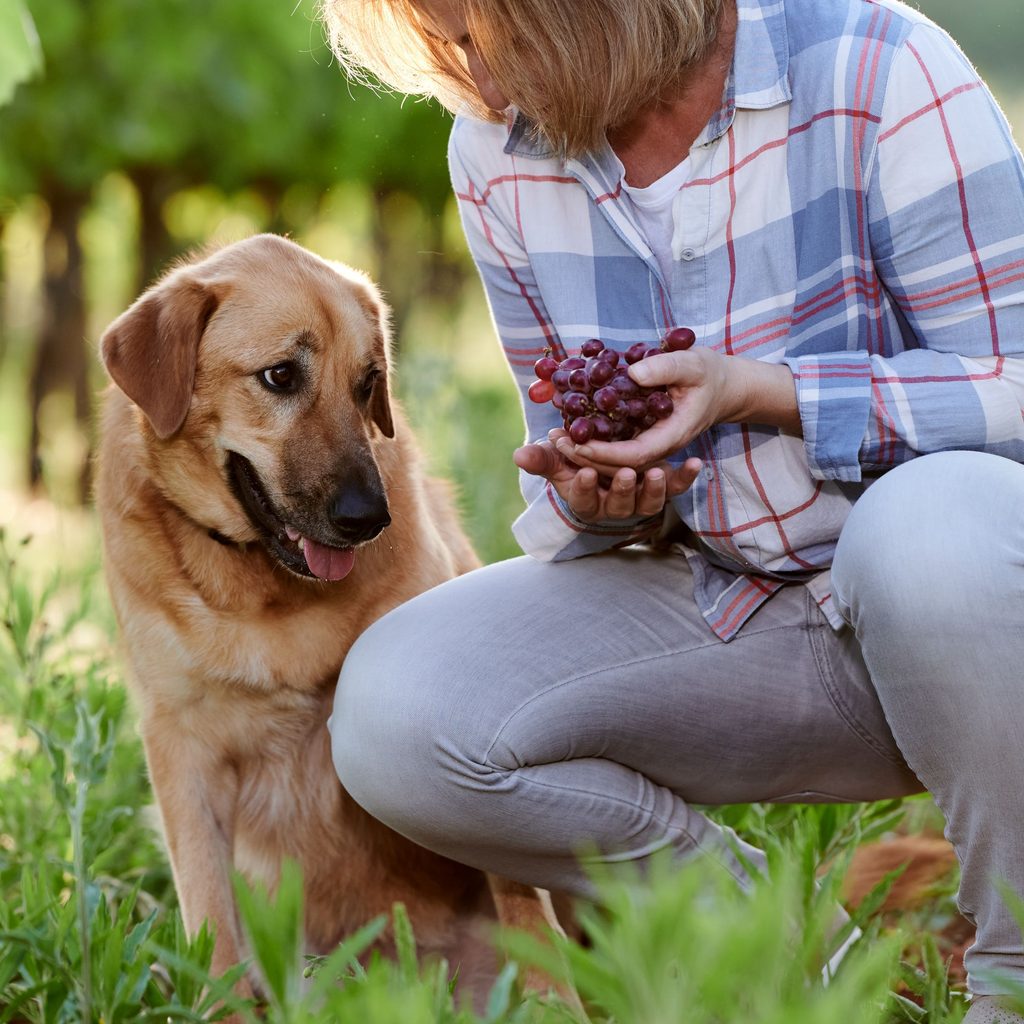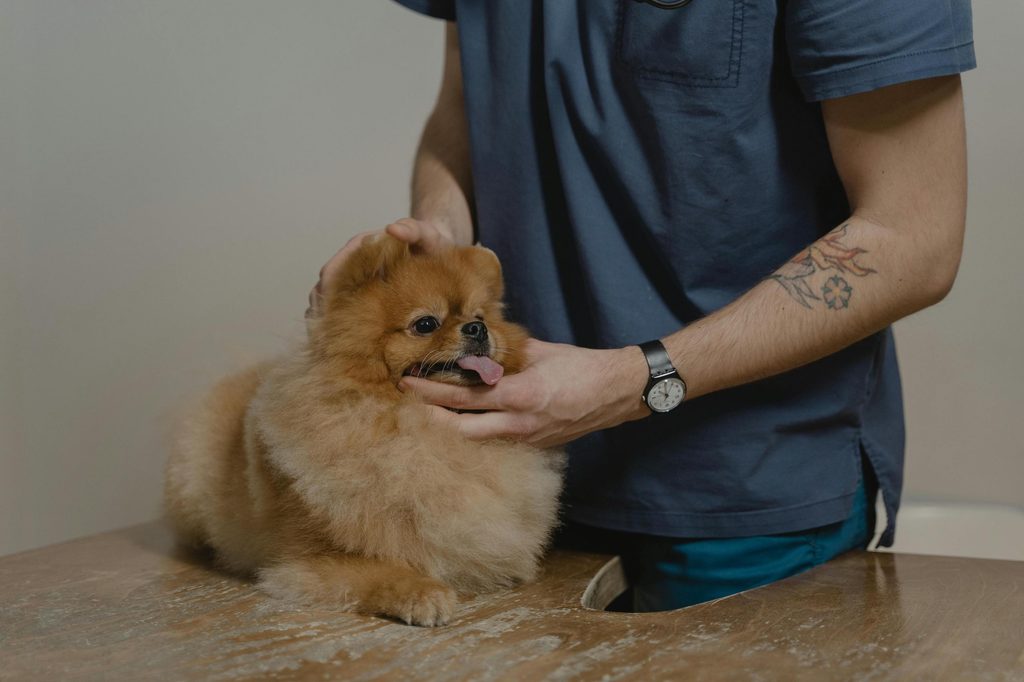If your pup enjoys munching on fresh fruits or veggies, they’re certainly not alone. Dogs benefit from the vitamins and minerals found in produce, but they’re not the main ingredient in a balanced canine diet. Even so, it never hurts to share a bite of fruit, right?
Many dog owners have wondered, “Can dogs eat grapes?” They are a healthy and tasty fruit for humans to munch on at any time of day, but not everything edible for people is also edible for dogs. It’s important to ask these questions before sharing any human food with your furry friend, as their safety and health always come first.
Here’s what you need to know about dogs and grapes:
Can dogs eat grapes?

Long story short: Dogs cannot eat grapes. They are not safe for canine consumption, even in the smallest amount. Veterinarians have found that grapes are extremely toxic to dogs, although no one has been able to pinpoint the reason they’re so dangerous. Some dogs experience more severe reactions than others, but many of these reactions are fatal. Not even grape seeds or skin are safe for them to eat, so it’s essential to keep them out of reach of prying paws.
According to VCA Animal Hospitals, “There has been speculation that the toxicity may be due to a mycotoxin (a toxic substance produced by a fungus or mold) or a salicylate (aspirin-like) drug that may be naturally found in the grape, resulting in decreased blood flow to the kidneys. More recently, tartaric acid has been proposed as the culprit.” Whatever is behind this life-threatening reaction, it’s always recommended to be safe rather than sorry. Please treat grape ingestion like an emergency!
Can dogs eat raisins?

Raisins are grapes that have been dried in the sun, but this drying process makes no difference in grapes’ toxicity to canines. Raisins (and their cousins, currants) are just as harmful as grapes when eaten by dogs, and the sugary ingredients some raisins are coated with only make the situation worse. They may be a delicious and easy snack, but they should never be shared with dogs.
In fact, grape toxicity can happen with any grape-containing product. Granola, jams, jellies, wines, and juices can all be poisonous to a dog, so it’s important to keep pantries closed at all times. Grape toxicity has even been reported after a dog licked wine pressings at a winery!
What happens if a dog eats grapes

If a dog eats a grape, they could experience a number of different symptoms. The severity of the symptoms depends on several factors — including how many grapes they consumed and the size of the dog — but some canines seem to be more sensitive to grape toxicity than others. Veterinarians do not know why this is or what makes a dog more sensitive.
However, they do know that the symptoms of grape poisoning in dogs can include:
- Lethargy, fatigue, weakness
- Decreased appetite
- Vomiting
- Diarrhea
Many of these symptoms begin a few hours after the grape is eaten, but they tend to be at their most severe around 24 hours after ingestion. By this time, however, kidney damage may have already begun. Signs of severe kidney injury, which are frequently seen alongside grape toxicity, include:
- Abdominal tenderness
- Dehydration
- Increased thirst and need to urinate
- Decreased urine production
Can dogs eat grape-flavored foods?

If a food or drink contains any real grape ingredients, including juice, it’s unsafe for a dog to consume. However, something that is flavored with artificial grape flavoring may not run the same risk. Even if there’s no grape in this food — like a grape-flavored candy — other ingredients like sweetener and artificial color are not ideal for your dog to have.
Remember, grape toxicity is no joke. It’s always better to err on the side of caution and keep grape-flavored foods and drinks where your pup can’t get to them. If you’re unsure whether your dog has consumed any grapes, please keep a very close eye on them and begin treatment at the first sign of symptoms.
What to do if your dog eats grapes

If you live near your veterinarian’s office, please give them a call as soon as you suspect your dog may have eaten grapes, raisins, or currants. If their office is closed or you don’t live nearby, you need to call your nearest emergency veterinary hospital. You can also call the ASPCA Animal Poison Control Center at (888) 426-4435 or the Pet Poison Helpline at (855) 764-7661 to determine the best course of action.
No definitive testing can determine whether a dog has consumed grapes or is suffering from grape toxicity, so a dog’s veterinarian will treat the presenting symptoms. They will use lab results, current symptoms, and their dietary history to decide the best course of action. The best — and often only — way to determine if a dog has eaten grapes is by asking their owners.
Veterinarians most often treat grape toxicity in dogs through intravenous fluids and by reducing the damage done to the kidneys. Dogs treated within 48 hours of grape exposure have the best prognosis, so please don’t wait to get your four-legged friend help if you even suspect they’ve eaten a grape or raisin.
The idea of your dog being poisoned by a normal household ingredient is scary, but the best thing you can do is ensure your grapes, raisins, and currants are stored far away from where your dogs can reach. A little diligence goes a long way in keeping pets safe!





